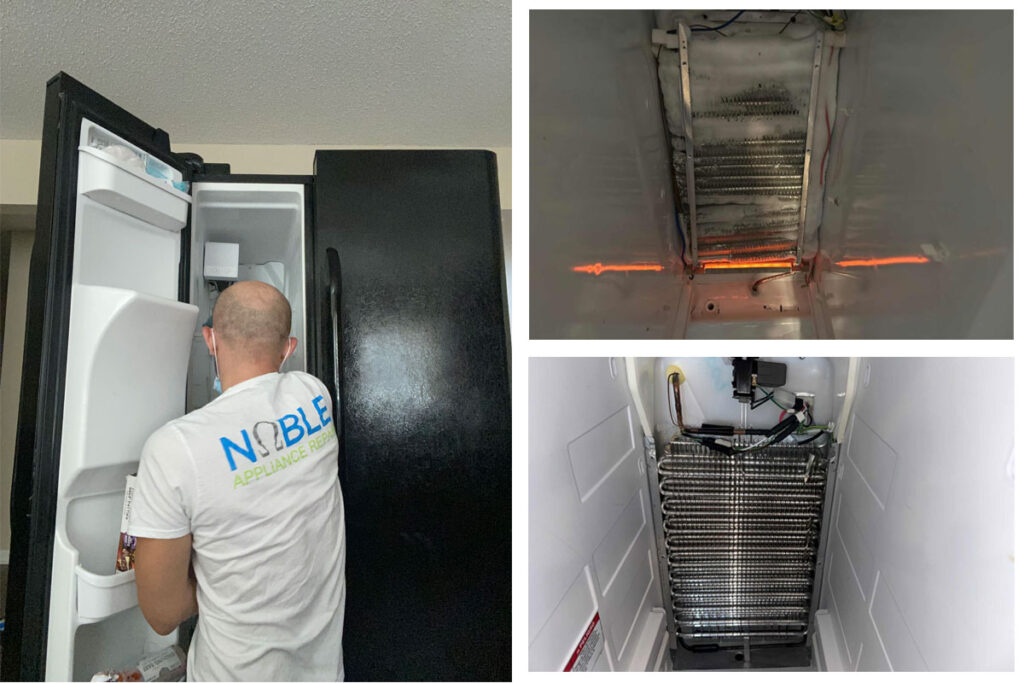Home | Blog | Why Your Refrigerator Is Making Strange Noises – Causes & Fixes
Why Your Refrigerator Is Making Strange Noises – Causes & Fixes
Any kind of unusual sound from your refrigerator signals potential trouble—when loud noise disrupts your kitchen, it rarely means normal operation. “Why is my fridge making noise?” This question triggers thousands of service calls yearly. However, early diagnosis often prevents costly repairs in the future, so let’s find out what those strange noises mean in practice.
What Are the Normal Sounds of a Refrigerator?

First of all, we should note that all fridges, including perfectly fine ones, produce some noise while operating. Normal refrigerator noises vary depending on make, model, age, and installation location. A brand new fridge might sound different from an older model, yet both could be operating smoothly. Things such as the condenser fan, compressor cycling, and water line filling naturally create sounds that manufacturers expect and design for, so you shouldn’t worry about them.
That’s why we can safely say that not every noise indicates a problem. Clicking and occasional crackling typically fall under normal refrigerator noises. Your refrigerator making noise during defrost cycles or after restocking is expected behavior as the system works to maintain the proper temperature. The key distinction between a “good” and a “bad” noise lies in consistency and volume—regular, predictable sounds at reasonable volumes generally indicate proper function, while sudden, loud, or grinding noises warrant investigation.
What Sounds Are Unusual for the Refrigerator?
Unusual refrigerator noises often begin subtly before escalating to more serious problems. A ticking or scraping sound typically indicates fan blades hitting obstacles, while a persistent buzzing sound suggests electrical component issues. When noise is so loud that it disrupts normal conversation, it indicates a serious refrigerator problem, especially when sounds come from both refrigerator and freezer compartments simultaneously—this typically signals a system-wide issue rather than a localized component failure.
A knocking noise often signals compressor problems that require professional attention. Clicking noise that repeats frequently outside the normal startup cycle indicates potential relay issues. Most of these “bad sounds” increase in intensity as the problem worsens. While occasional unusual sounds may temporarily resolve, they typically return later with greater intensity. Most concerning are sudden changes in your refrigerator’s sound pattern—these demand immediate investigation before minor issues become major repairs.
Why Is Your Refrigerator Making Weird Noise: Main Causes
Identifying why your fridge is making weird noises determines proper solutions. Strange noises from your refrigerator may indicate a wide range of issues, each of which requires a different approach. Some problems need simple DIY fixes while others demand professional refrigerator repair that will be impossible without special knowledge and equipment. Now, let’s proceed to the main causes of strange noises from your refrigerator to help you understand what does it mean when the refrigerator makes noise:
Faulty Compressor
A faulty compressor is one of the most common causes of distinct refrigerator noises that worsen over time. You might notice a low buzzing sound that grows louder as the compressor struggles to maintain cooling. This can change to clicking during startup attempts or grinding when parts wear down. Severe cases produce knocking sounds like metal hitting metal—warning of imminent failure requiring professional repair as soon as possible.
Dirty or Malfunctioning Condenser Fan
A dirty condenser fan creates grinding or loud buzzing sounds when excess dust restricts fan blade movement. Condenser fan blades are why your refrigerator is making noise at the back near the floor. They scrape against accumulated debris, causing rhythmic sounds. Consider the fact that as dust builds up, the motor strains potentially leading to complete failure. A simple cleaning often solves this issue.
Evaporator Fan Problems
The evaporator fan circulates cold air throughout your refrigerator. Not all refrigerators have the same evaporator fan design, so sounds vary by model. Additionally, fan motors can develop bearing issues creating clicking or thumping noises.
Loose or Unsecured Parts
Loose parts cause the widest range of refrigerator sounds, from rattling and vibrating to ticking. Cabinet panels, water lines, or other components may create noise when they come loose. These sounds typically respond to movement or door operation. Simple fixes like tightening screws or adjusting leveling feet often eliminate these annoying but generally harmless noises.
Refrigerant Flowing Through Coils
Refrigerant circulation creates a mild gurgling or hissing as it moves through coils. That’s why your fridge humming quietly is considered normal. Loud noise from refrigerant suggests potential leaks or pressure issues. These sounds typically cycle with the compressor operation. This issue will most likely require a service call.
Ice Maker Problems
Ice maker issues cause clicking, grinding, or buzzing noise during the ice production cycle. Why your fridge is making a loud noise might be due to water valve problems or a broken connection in the ice system. Mineral buildup in water lines creates distinctive knocking sounds during filling cycles. The complexity of repair in this case will depend on the specific issue.
Blocked or Frozen Drain Line
Frozen drain lines produce gurgling or bubbling sounds when water cannot flow properly. This obstruction forces water to find alternative paths, creating unusual noises. Overflow of drip pan occurs when drainage systems fail to remove accumulated water. This is typically a simple DIY fix using a pipe cleaner and warm water flush, though severe cases with ice buildup inside walls may require professional service.
Expansion and Contraction of Materials
Temperature fluctuations cause refrigerator materials to expand and contract naturally. This creates popping or cracking sounds, especially after the defrost cycles are complete. Why is your fridge so loud all of a sudden might be due to these normal temperature adaptations occurring more dramatically. If this is the case, there’s no need for concern as these sounds are part of normal operation.
Unbalanced or Improperly Leveled Fridge
An unleveled refrigerator creates vibrating sounds that resonate through the cabinet. This vibration transfers to nearby objects, amplifying noise significantly. Fixing might be as simple as adjusting the feet to create proper balance and stability.
Defective Motor Bearings
Worn motor bearings produce grinding or squealing sounds that worsen over time. These components support rotating parts in fans and compressors. Defective bearings typically cause excessive noise during operation and require replacement rather than repair. This issue typically requires a specialized repairman to be fixed.
Fixes for Common Fridge Noises
- Level your refrigerator: Adjust the leveling feet to eliminate vibrating sounds that resonate through the cabinet.
- Clean the condenser fan: Remove excess dust that restricts blade movement, causing grinding or buzzing sounds.
- Check and tighten loose parts: Fix rattling, vibrating, and ticking by securing cabinet panels and components.
- Clear the drain line:. Eliminate gurgling or bubbling noises by unclogging frozen drain lines.
- Clean the drain pan: Empty and sanitize to prevent unusual dripping sounds during defrost cycles.
- Test the light switch: Fix buzzing that might be caused by faulty door switches.
- Remove ice buildup: Address cracking sounds by clearing ice that disrupts automatic defrost operations.
- Verify water supply: Fix clicking or knocking in ice maker systems by checking water connections.
- Check door seals: Prevent compressor strain (and its associated buzzing) by ensuring proper door closure.
We have a special article with a list of the most common repair scenarios. You can read about it in this refrigerator repair guide.
When to Call for a Professional Repair Service
When your fridge making weird noise persists despite the simple fixes mentioned above, it’s time to call professionals.
First of all, let’s clarify serious warning signs. Unusual sounds like grinding compressors, metal-on-metal scraping, or sudden loud buzzing indicate serious mechanical problems requiring expert diagnosis. Attempting DIY repairs on sealed systems can void warranties and potentially cause refrigerant leaks or electrical hazards.
So, we have a professional solution for your issues! Noble BHS technicians bring specialized tools and manufacturer parts to quickly resolve complex issues, extending your appliance’ lifespan. Don’t risk complete system failure—contact Noble BHS today for same-day emergency service when strange refrigerator noises persist.
Don’t let refrigerator problems disrupt your day—call Noble BHS at (678) 646-4346 for expert repairs that end those troubling noises for good!
You may also be interested in
- Replace or Repair Your Appliances: A Complete Guide to Making the Right Choice
- How Much Does Appliance Repair Cost
- Why Your Fridge Is Making Loud Noise and How to Fix It
- Should You Repair or Replace Refrigerator When it Breaks Down?
- Repair or Replace Washing Machine: Making the Right Choice
- Should You Repair or Replace Your Dishwasher?




